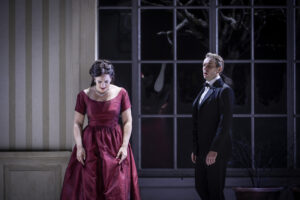
Théâtre des Champs-Elysées 2024-25 Review: Werther
Contemporary Production Gives Massenet’s Opera New Splendor
By Andréas Rey(Photo : Vincent PONTET)
From March 21 to April 6, the Théâtre des Champs Elysées presents a new production of Jules Massenet’s “Werther,” staged by Christof Loy and directed by Silvia Aurea De Stefano.
It’s probably no exaggeration to consider it one of the best of the first quarter of 2025, at least. In fact, it’s been a long time since a “Werther” has been staged to such a high standard in Paris. The few reviews that follow should not distract readers. First of all, we must salute the German director’s fine work, in terms of set design, costumes and acting.
The stage, designed by German set designer Johannes Leiacker, is rich without being confusing. The stage depth is divided into three sections, with the first furnished with a table, chairs and an armchair, second behind sliding panels opening onto a living room where a large fir tree dominates the final acts, and the third behind a bay window showing a tree and the seasons. The scene, its modest elegance, simply shows the passing of time, and the bourgeois milieu in which the drama is played out, as in “Eugene Onegin,” or “Der Rosenkavalier.”
We must continue our praise this performance with the costumes designed by Dutch costume designer Robby Duiveman, which gradually indicate the aging of the protagonists. Werther starts out in a blue suit with boots and a very mod hairstyle, before a three-piece, neat shoes and a more mature hairstyle, and dying in a tuxedo and lacquered shoes. But it’s Charlotte who’s the most distinctive. She starts with a white ball gown and loose hair, then a severe dress and stricter hairstyle before wearing a red dress and fur coat.
Then there’s the careful, natural and almost spontaneous acting of the performers. They seem to live rather than play, allowing the spectator to feel the drama more fully.
The quality of the staging here matches that of the musical execution. The Les Siècles orchestra, led by Swiss conductor Marc Leroy-Calatayud, maintains a remarkable fluidity, prettiness and appropriateness throughout the work. Fastidious ears may regret that they play a little too loudly, damaging Massenet’s typical orchestral melodiousness, but they will admit that the balance between orchestra and voices is maintained from start to finish, including in the very difficult duets. The interplay between the orchestral sections, especially the strings, and the musical flow are never broken.
The performers, all with perfect articulation and diction, are no exception to the overall quality. First of all, the secondary roles. The father, including the bailiff, played by French baritone Marc Scoffoni, has a light, undergrowth-colored bass, and the children’s chorus remains fresh and tangy. French baritone Jean-Sébastien Bou‘s Albert lends the opera a strong, resonant gravity. And the drinking companions of French-Israeli bass-baritone Yuri Kissin as Johann and French tenor Rodolphe Briand as Schmidt tint the opera with their amusing playfulness.
Fussy ears may regret that the metallic timbre of Swiss soprano Marina Viotti, lacking the sweetness of legato, doesn’t fully convey Charlotte’s childishness, especially in the letter scene. Fortunately, her acting makes up for this, illustrating the rift between her marriage to Albert and her love for Werther. Franco-American soprano Sandra Hamaoui‘s Sophie, her more supple timbre, is more endearing than Charlotte’s character.
But the greatest success of this production is Benjamin Bernheim‘s Werther. After shining in the Italian repertoire, he now shines in the French repertoire. We remember his Hoffmann and Faust at the Bastille, and now he’s burning brightly as Werther. Soon he’ll be Des Grieux in Massenet’s “Manon,” again at the Bastille. Each of his arias is such a success that it’s hard to decide which to praise first. He almost turns the stage into a recital as soon as he sings, including in the duets. Playing with his range, like a gymnast with his body, he is, after Kauffman, one of the great contemporary Werthers.
The quality of this performance even underlines what distances some from “Werther” in particular and Massenet in general, namely, an almost bigoted conservatism, setting the action at Christmas, preventing the characters from maturing, and killing Werther, the troublemaker, to preserve the peace of the Charlotte-Albert household, and above all giving Massenet a prettiness and not a beauty, as in Puccini.
Those who appreciate Massenet will see in this production a Massenet in a new splendor. Those who like him less will still appreciate this production, which will undoubtedly be remembered for years to come.



